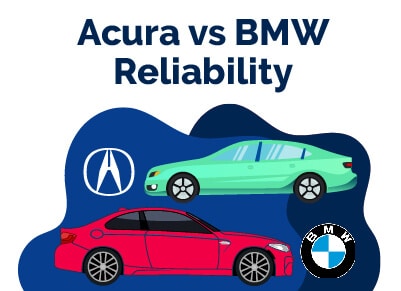Acura vs. BMW Reliability (Key Differences)
March 23, 2023


Chris is Head of Content for FindTheBestCarPrice and is based out of Philadelphia, PA. As a seasoned automotive industry analyst and car enthusiast, he ensures the highest level of quality across all our content and curates our picks for the best deals each month.
Chris studied information systems and marketing at Drexel University and writes about a wide range of topics ranging from car buying tips to troubleshooting common mechanical issues.
When he’s not thinking about cars, he likes to stay in with his dog and make an “attempt” to finish a crossword puzzle (he’s not quite at the Saturday/Sunday level…yet). As a former cheesemonger, Chris still has a “sharp” passion for all things cheese, and his fridge is always loaded with it!
Chris also has a passion for things that go fast, and drones are no exception. He spends some of his time writing for Dronesourced.
When buying a new car, reliability stands as an important consideration to avoid frequent and costly repairs.
Acura, Honda's luxury arm, is celebrated for its dependable lineup, mirroring the Japanese automaker's reputation for reliability.
BMW, in contrast, is lauded for its premium quality vehicles that blend luxury with performance.
The debate between Acura and BMW on reliability fronts presents a nuanced view.
Acura generally outperforms BMW in reliability assessments, offering superior resale values, more affordable maintenance and repair costs, and more favorable warranty terms.
This translates to a more cost-effective ownership experience for Acura owners compared to those with BMWs.
Let’s compare Acura’s and BMW's reliability to help you make better choices.
Table of Contents
Acura vs. BMW: A Detailed Comparison
| Features | Acura | BMW |
| Gas Mileage | ||
| Repair and Maintenance cost | ||
| Engine and Performance | ||
| Safety | ||
| Technology | ||
| Durability | ||
| Design |
Acura vs. BMW: Which is better?
Like most car brands, Acura and BMW have yet to maintain a steady reliability rating. Even though Acura offers a better reliability level, there are many areas where BMW is better.
According to RepairPal, Acura has a reliability rating of 4.0/5.0, ranking 2nd out of 32 car brands. BMWs ranks 30th out of 32 car brands, with a meager rating of 2.5/5.0.
On the 2021 Consumer Reports Auto Reliability Survey, Acura ranked 3rd out of 32 brands, scoring 78 out of 100. BMW only ranked 13th out of 32 brands, with an overall score of 66 out of 100.
Everything takes a crazy turn as BMW ranks higher than Acura in the 2022 JD Power dependability survey.
The repair and maintenance cost is lower on Acura than BMW, the same as the frequency and severity of damages. The durability is almost identical for both car brands, but Acura has a longer powertrain warranty.
Cars from both brands can get up to 200,000 miles, but the extended warranty coverage from Acura will give you enough peace of mind.
BMW beats Acura by offering better engines and performance. This doesn't in any way imply that Acura makes bad cars. BMW has been producing turbo engines for close to 14 years, earlier than Acura got into the business.
Aside from experience in engine production, BMW cars achieve better driving dynamics, speed, and aesthetics than Acuras.
You get the feeling of driving a luxurious, sporty car in a BMW than you will experience on an Acura.
The choice between both cars boils down to if you want a car with less cost of ownership or if you are more interested in experiencing the joy of driving.
Acura vs. BMW Reliability: Design
Design is a subjective matter, and different drivers have different preferences when it comes to car design. BMW and Acura are popular brands with impressive reputations for producing high-quality vehicles.
The design philosophies are different, but you'll need to understand each brand to choose which one appeals to you. BMW cars are known for their sleek and sporty designs, while Acura takes pride in its luxury and sophistication.
Acura emphasizes the use of high-quality quality materials, and advanced manufacturing techniques, structured to match the basic needs of everyday driving.
On the other hand, BMW prioritizes performance and driving dynamics. Sometimes, this comes at the expense of reliability.
Both car brands pass their cars through rigorous testing to achieve the required standard. Yet, some BMW models are more prone to issues than vehicles from other brands that prioritize reliability.
BMW's design employs some level of complexity in its systems and components. This makes repairs and maintenance expensive.
Winner: Both
Acura vs. BMW Reliability: Gas Mileage
Most times, it is difficult to compare the fuel efficiency of Acura and BMW models. You'll have to compare specific models or trims you wish to buy.
You must understand that the size and weight of the vehicle, the type of engine, and the way the vehicle is driven impact the gas mileage achieved by the vehicle.
Comparing most BMW cars with Acura cars, BMW takes the lead with gas mileage. BMW X3 has better gas mileage than Acura RDX. You will also get better gas mileage on the BMW X4 than on Acura MDX.
The list continues even for Acura MDX and BMW X5.
To achieve this, BMW integrates powerful and fuel-efficient systems with advanced engine designs that save fuel. The aerodynamic design of BMW tremendously impacts its fuel efficiency as it reduces drag.
The use of lightweight yet high-strength materials, engine efficiency with advanced technology like directory injection, and variable valve timing influence better gas mileage on BMW.
Winner: BMW
Acura vs. BMW Reliability: Repair and Maintenance Cost
Acura has a relatively lower repair and maintenance cost than BMW. This is the same as the frequency for major or minor repairs. Acura has an average annual repair cost of $501, whereas BMW has up to $968.
You'll get a 0.9 chance of visiting a repair shop with a BMW and a 15% chance that the problem is severe. Acura only has an 8% chance of severe damage and a 0.4 chance of regular visits.
Severity, frequency, cost of repairs and maintenance is low on Acura.
Another factor that contributes to the reliability of a car is customer satisfaction. This is usually improved by the warranty coverage and other services and support programs that car brands integrate to make things easier for users.
BMW and Acura have a wide range of services and support programs that help owners maintain their cars.
From roadside assistance to extended warranties to maintenance plans, there are many services and authorized service centers to keep your vehicles trouble-free at minimal cost throughout their lifespan.
Winner: Acura
Acura vs. BMW Reliability: Engine and Performance
Acura and BMW engines employ different mechanisms that distinguish their reliability and efficiency. There are a few technologies that Acura employs to achieve great performance; Variable Valve Timing (VVT), Advanced materials, and direct injection.
Many Acura engines use VVT technology to optimize the timing of the valves for improved fuel efficiency and performance. Advanced materials like lightweight aluminium alloys are used to help reduce weight and improve efficiency.
Some Acura engines use direct injection technology, which helps improve fuel efficiency by injecting fuel directly into the combustion chamber rather than the intake manifold.
BMW utilizes TwinPower Turbo technology, EfficientDynamics technology, and direct injection. The TwinPower Turbo technology combines a small primary turbocharger with a larger secondary turbocharger to deliver strong acceleration and efficient performance.
The EfficientDynamics technology helps improve fuel efficiency and reduce emissions by optimizing engine performance and using advanced technologies such as auto start-stop and brake energy regeneration.
Some BMW engines use direct injection technology, which can help improve fuel efficiency by injecting fuel directly into the combustion chamber rather than the intake manifold.
You must understand that the characteristics and ratings of the engines from these brands vary according to different models.
On a general scale, BMW beats Acura with better performance. BMWs are the type of cars that you go for when you need smooth driving, advanced performance and handling.
This is an amazing standard that Acura has tried hard to meet. The difference is wide on different models from the same brands.
Winner: BMW
Acura vs. BMW Reliability: Safety and Technology
Both Acura and BMW are well known for their advanced technology and engineering. This is evident in the advanced safety and driver assist systems, as well as its use of high-quality materials and craftsmanship.
Some of the technology features available on Acura vehicles include adaptive cruise control, automatic emergency braking, lane-keeping assist, and blind spot monitoring.
Acura also offers a range of infotainment and connectivity features, including Apple CarPlay and Android Auto integration, as well as a variety of audio and entertainment systems.
BMW vehicles contain high-tech features, including advanced driver assist systems, advanced infotainment systems, and connectivity features such as BMW ConnectedDrive.
However, irrespective of how good BMW's safety features are, Acura has more cars earning the IIHS Top Safety Pick (+).
Winner: Acura
Conclusion
The choice between the BMW and Acura will depend on your priorities and the specific model you choose.
If reliability is a top concern, Acura may be the better choice, but if you're more focused on performance and driving dynamics, BMW is the best way to go.
Best Car Deals by Category
Posted in Car Buying Tips, Car Troubleshooting |




